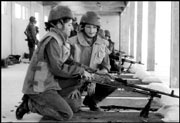SEATTLE JEWISH FILM FESTIVAL
runs April 20-28 at Cinerama tickets, schedule, and information: 325-6500, www.ajcseattle.org.
TALK ABOUT ripped from the headlines. This year’s Seattle Jewish Film Festival arrives at a moment when that tiny tribe and its small sliver of a country are once again dominating the news. Among its 35-odd titles, the fest includes a handful of documentaries that are painfully relevant to the current upheaval, some lighter fare, and several Holocaust-themed movies.
A must-see is the short documentary Primetime War (2 p.m. Sun., April 21), a brutally honest expos頯f media parasitism. “It’s a game,” says Alon, a voluble, winningly self-aware Israeli cameraman as he and his Palestinian colleague Jimmy stand on the West Bank among a horde of other news gatherers, waiting for something to happen. In one almost unwatchable scene, the camera wielders surround—literally like feasting jackals—a writhing Israeli soldier who’s just been hit.
Shot during the last Palestinian intifada back in 1997 (which now looks remarkably benign), Primetime captures just how much the uprising—from rock throwing to bus bombing—has been driven by the presence of the media and designed for media consumption. “If this were a Serb soldier, I couldn’t even come this close,” says Alon. “The soldier respects my right to take pictures, even though my camera triggers the situation.” No one’s judged and no one’s blamed; it’s obvious we’re all complicit.
Playing with Primetime is a more recent documentary, Street Under Fire, about a residential block in Jerusalem that’s been subjected to repeated mortar attacks from a nearby Palestinian village. Less sophisticated than Primetime, and clearly intended to generate sympathy for its subjects (swelling music, distraught children’s faces, etc.), the film is nonetheless a valuable and disturbing window into the life of people involuntarily brought into the front lines of this conflict. (A panel discussion follows the two films.)
Considerably less raw—and less grim— is Company Jasmine (7 p.m. Weds., April 24), a slick, hour-long documentary about young Israeli women going through the army’s grueling officer training program. G.I. Jane stuff is also leavened with Private Benjamin: We see the women—all of whom happen to be fabulous babes—brushing their hair, frolicking in a pool, and arguing with their mothers. Though it often comes off like a recruitment video, Jasmine is ultimately quite touching in its portrayal of women who may, in fact, be fighting and dying as you read this.
IT’S NOT ALL war and politics, fortunately, since the festival’s opening-night gala feature, Desperado Square (8:30 p.m. Sat., April 20), focuses squarely on the universal bonds—and conflicts—of family. The 1964 Bollywood musical Sangam serves as a Proustian madeleine for the Mandaboun clan, suggesting happier days when their Sephardic community gathered in their now-shuttered family cinema. Could it be reopened to show the movie again? Pleasing if predictable, Square includes lots of comic color—all set in a kind of ’60s-’70s never land outside Tel Aviv.
Family also dominates Late Marriage (8:30 p.m. Sat., April 27), which features one of the most frightening and implacable mothers in screen history. Tanklike Soviet Georgian immigrant Lili is determined that her 31-year-old philosophy student son, Zaza, should give up his scandalously divorced Moroccan lover. Will he capitulate? Set in contemporary Tel Aviv, Marriage conveys the tension between tradition and Western-style freedom before reaching a weirdly ambiguous conclusion.
Fun and trashy in a TV-cop-show kind of way, Clean Sweep (9:30 p.m. Mon., April 22) concerns one Israeli policewoman’s quest for an orgasm, but the sex is pretty tame. Surrounded by chauvinist crooks and cops, heroine Aya’s final triumph brings a smile (ࠬa Yojimbo), and it’s impossible not to like a movie using the POV shot of a deranged cat.
The Oscar-nominated Czech Divided We Fall (7 p.m. Tues., April 23), which played here last year, is a superior and generally comic treatment of the Jew- hiding-in-the-attic WWII movie theme.
Several nonnews documentaries stand out: Blue Vinyl (3:30 p.m. Sun., April 28) is a bit like Roger and Me, as co-director Judith Helfand bumbles around the globe to learn about the nefarious environmental legacy of the PVC siding that her Merrick, Long Island, parents have installed on her childhood home. The beautiful Russian Farewell (1 p.m. Fri., April 26) hauntingly photographs the last days on a Russian shtetl before 90-year-old Yankel emigrates to Israel. The U.S.-made The Sweetest Sound (10 a.m. Sun., April 28) hilariously captures the selfish attachment we place on our names. It’s paired with other shorts, including Seattle director Brian McDonald’s White Face, which deftly satirizes the universality of discrimination for laughs—something we all need right now.




